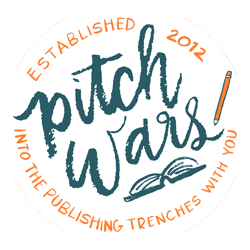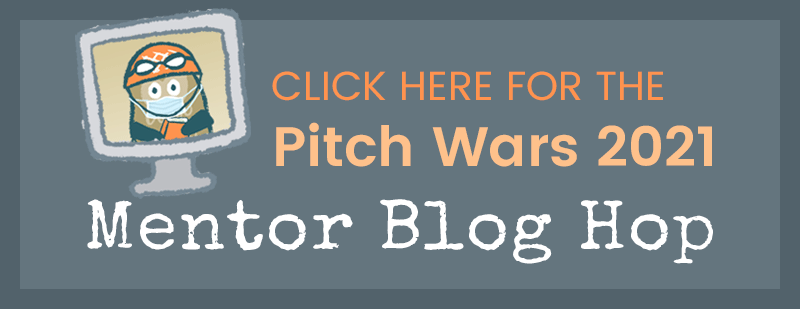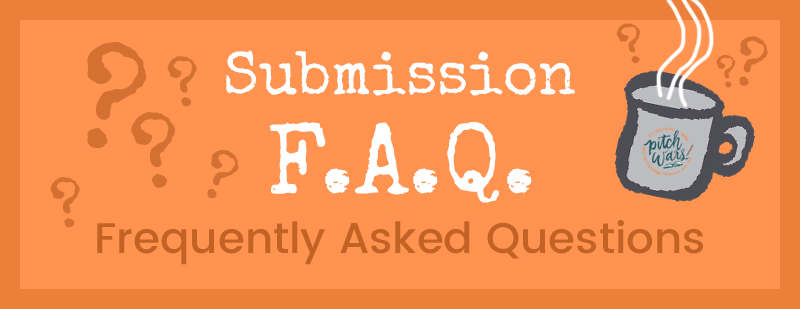 Welcome to the Pitch Wars Workshops with some of our amazing past and 2021 mentors. From a lottery drawing, we selected writers to receive a query and first page critique from one of our mentors. We’ll be posting some of the critiques leading up to the Pitch Wars submission window. Our hope is that these samples will help you in shining up your query and first page.
Welcome to the Pitch Wars Workshops with some of our amazing past and 2021 mentors. From a lottery drawing, we selected writers to receive a query and first page critique from one of our mentors. We’ll be posting some of the critiques leading up to the Pitch Wars submission window. Our hope is that these samples will help you in shining up your query and first page.
We appreciate our mentors for generously dedicating their time to do the critiques. If you have something encouraging to add, feel free to comment below. Please keep all comments tasteful. Our comments are set to moderate, and we will delete any inappropriate or hurtful ones before approving them.
Next up we have:
Pitch Wars Mentor Michella Domenici
 Michella S. Domenici was born and raised in Brooklyn, NY. She studied English and History at Fordham University. She works with Scholastic as the Licensing, Brands & Media Coordinator, helping to bring licensed children’s books to life. She was previously represented by The Bent Agency, and she is currently working on her next great manuscript. Michella has been involved with Pitch Wars as a mentee in 2015, a mentor in 2017, and she has helped moderate #Pitmad. When not reading or writing, Michella enjoys musicals, yoga, and spending time outdoors.
Michella S. Domenici was born and raised in Brooklyn, NY. She studied English and History at Fordham University. She works with Scholastic as the Licensing, Brands & Media Coordinator, helping to bring licensed children’s books to life. She was previously represented by The Bent Agency, and she is currently working on her next great manuscript. Michella has been involved with Pitch Wars as a mentee in 2015, a mentor in 2017, and she has helped moderate #Pitmad. When not reading or writing, Michella enjoys musicals, yoga, and spending time outdoors.
Michella’s critique
Category: Adult: historical fiction
Query:
Dear X,
Here’s the story I want to tell: [I appreciate the creativity, but you may be better served by starting with a more conventional opening by including a personalization for the agent or “I am seeking representation for my historical fiction manuscript” and include the title and word count. Every agent will have an opinion on personalizations and where to put it if they want it included, but generally starting off a query with the age category, genre, title and word count is great because it orients the agent right away.]
Doris Kenyon and Helen Worthing—young, beautiful, and ambitious—arrive in New York City in the early 1920s determined to break into show business [This is great! It immediately introduces the protagonists and includes some details about them, while also telling us what they want. Awesome!]. Doris, the teenaged daughter of a Syracuse minister, makes a splash on Broadway and in the local film industry [I’m not sure if “and in the local film industry” is necessary since we already have a hint at Broadway success. It might eat up words that could be better spent elsewhere. It is usually recommended queries stick to 250 words.]. Helen, the product of a broken home in Louisville, is fresh off a beauty contest win—the “Most Beautiful Girl in America”[I don’t think you need this aside since you tell us in the first one she’s beautiful and it is incidental to what really matters (that she finds fame in Ziegfeld Follies).]—which lands her a role in the Ziegfeld Follies. [This is a great opening paragraph that introduces us to the two main characters and establishes their goals.]
They’re members of the generation of women who enjoy the first fruits of emancipation. Even so, they run headlong into barriers—including powerful men who exploit them and an industry that abuses them. As the title of one of Doris’s films put it, they are halfway girls: caught between the end of one stifling era and the dawning of a more liberated one. [I love this, but I’m concerned it reads more like back cover copy instead of a query. While there are similarities between the two, they are different. Cover copy can get away with more vagueness, but a query generally needs to be specific. This paragraph seems focused on setting a scene, illustrated by the first and last sentence. I get the sense you want to center us into the time period and give us a theme to nibble on. But you may be better served telling us explicitly who one powerful man is and what he does that stands in our protagonists way. As it stands, there is no antagonist in this query. Additionally, while the “halfway girls” tidbit is interesting, I don’t think you need it. It seems like you’re trying to explain the meaning behind the book title (which you don’t need to do in a query).]
They are brave and resourceful [I don’t think you need to tell us this, either. You’ve already shown it by telling us they came to NYC to break into show business, called them ambitious in the opening sentence, and explained how they got their first breaks in the industry. Great job! Instead, this sentence reads like a transition between paragraph 2 and 3, but it doesn’t really hold any weight, establish something new, or logically set up the next sentence.]. When they find each other at a celebrated New York photographer’s studio, a passionate friendship is ignited [Oh, because they are introduced together, I thought they arrived in NYC as friends. Maybe you could do an intro paragraph for each of them and include what they want, how they intend to get it, and what stands in their way. That way it’s clearer they don’t know each other at the beginning.] [Additionally, is passionate the best word to describe their friendship? This makes me think they maybe became girlfriends or lovers. If they are platonic friends the whole way through, perhaps consider a different word as readers looking for specific representation might be disappointed.]. They break the rules together—first in New York and later in Hollywood [What rules? How do they break them?]. But the studios are determined to rein in their scandalous relationships [With who?], their feminist stances, and above all, their independence [If you can illustrate how their feminism threatens their careers, or whoever it threatens, that would be great. We need to get a strong sense of tension. As tension rises, so do the stakes.]. Meanwhile, the world tempts them—with booze, drugs, fame, and money [Is there a way to make this personal? These are things that could tempt anyone. Why does this threaten them? Is there something more personal that could threaten their goals, for example an estranged parent coming back into their life, one of the earlier men they had to overcome in their career who possesses a damaging secret, etc? These are people/obstacles unique to the characters and your story.]. As the stakes get higher [How? And what were the stakes to begin with? That they would never become famous?], they pay a high price for their defiance [Defiance of who or what? My guess is their defiance of society, but this isn’t very clear. What does this high price look like? Remember, specifics, not vagueness.]. Will their friendship be enough to protect them?
[Protect them from what? Are the main stakes of the story that they could lose each other’s friendship? Never achieve the level of fame they want?] [I think you need another line to close it all out. “If their friendship fails, they could lose xyz,” or something like this to crystalize the stakes. We need to know what’s at stake if they fail.] [I also struggled to tell what Doris and Helen’s individual character arcs are. A query letter should convey what sort of journey they need to undertake to achieve their ultimate goals/get what they “need” rather than what they “want”. So if Doris and Helen begin the story thinking what they “want” to be happy is fame, they’ll learn over the course of the book as their fame is threatened and their newfound friendship is also threatened, that what they actually “need” to be happy is their friendship, even if it means risking their fame. Does that make sense?]
The manuscript, complete at 110,000 words, is a historical fiction. But it is closely based on the lives of Doris Kenyon and Helen Worthing—two real actors who helped write a dramatic chapter in the turbulent early history of “the Industry.” [Who are you quoting here?] [You may also want to include some comp titles to help the agent understand where your book fits in the market. Comp titles also demonstrate you’re a well-read writer who knows what’s happening within your genre. From your query, two titles that spring to mind immediately are City of Girls by Elizabeth Gilbert and The Seven Husbands of Evelyn Hugo by Taylor Jenkins Reid. I thought of them because of the ambitious female protagonists and the focus on show business.] It uses the device of a narrator who is unearthing their story, piece by piece, with the perspective moving from Doris and Helen to the narrator and back again [I found this a little confusing… perhaps there’s a more succinct way to explain this. Is this saying there are two close POVs for Doris and Helen, but also a third narrator?]. I also have a large collection of supporting visual materials, which present some fun marketing opportunities. [Hmmm… I’m not sure what this means and if it’s needed. Also, if these aren’t your own photographs, a potential publisher would need to worry about clearing permissions which can sometimes be expensive. This might be a tidbit worth saving for a phone call with an offering agent. But if you decide to leave it in, I doubt it would be harmful.]
I’m the author of more than 40 published nonfiction titles. Aside from a published murder mystery, which sold about 14,000 copies [You may want to leave out this stat and save it for a phone call], this is my first work of fiction [I might revise this to “I’ve also published a murder mystery. This is my historical fiction debut.” The current sentence construction is unnecessarily wordy, plus there’s no reason to call this your first work of fiction when it isn’t. It’s fantastic you’ve published so many books. Own it!] It has not been shared with publishers. Thanks for considering it.
First page:
The photograph
First there was Doris, and several years after that, Helen.
By which I mean I came across Doris first. I learned a lot about her [Such as? What’s a detail you could throw out that could entice the reader? The detail you pick also will show us a little bit about who this character is based on what they care about.] and I thought I understood her pretty well [Why would they think that? Can you help us get into the head of this character a little more? What feeling did learning about Doris evoke? What about Doris made this character feel a kinship to her (so we learn about the character and Doris at the same time).]. There were missing pieces, but the story seemed nearly complete. [What’s missing? What made Doris’ story feel complete? This feels intentionally vague.]
But [I’m not sure this is the best way to transition into this next paragraph as the previous sentence has a clause beginning with but. When you put them together, “…but the story seemed nearly complete. But one day…” I don’t think it flows logically. What does one have to do with the other?] one day in a cluttered antique store just off La Cienega in downtown L.A., I stumble upon a framed sepia photograph, eight by ten, of two women lying in a large bed. [The change from past in the opening sentences to present tense here is throwing me off. Is it necessary to begin with the backstory instead of throwing us right into the antique store setting?]
They are bathed in light from several directions, so the scene has been carefully lit by a professional photographer. Who has hired this photographer, and why? [I can see this character cares about this photo, but it’s not clear why they care. What is unique about this photo? Based on the description, it appears to be an average photograph taken by a photographer. If the interest is because it’s Doris or Doris and a stranger, then tell us that.]
The woman on the left is half-sitting, propped up on her right elbow. Doris, unmistakably [What gives it away that it is Doris?]. The other woman is lying down, her head on the topmost of a pile of pillows [This is clunky and maybe a little redundant? We don’t need ‘topmost.’], hands tucked up under her chin [This description is very hard to imagine. I can see her on her stomach with her elbows on the pillows and her hands propping up her chin. I can see her on her back with her head on the pillows, but I don’t understand why her hands would be under her chin. If she’s on her side, I also don’t get why both her hands would be under her chin]. [Is the second woman Helen and this is where the character discovers her, thus delivering the promise of the first line?]
They are beautiful. Dressed in simple white cotton nightgowns, they stare directly at the camera, looking Mona Lisa-amused [You don’t need a comma to offset this last little bit. I’m also struggling with the passive voice here. Can you bring the character into this more? Does it feel like they are staring directly at him/her/them?]. The scene has subtle off-key notes. Like, if they’re just waking up or just turning in, why is the unknown woman so carefully made up? [The character has already established they think a photographer took this photo. Why is the fact that she’s wearing make-up strange? Staged photos often involve make-up. Also women definitely wear make-up to bed, and depending on the time period, it may have been more common for them to do so.] Is it my imagination or are they just a little bit drunk? [What makes it appear that way?] Why has Doris, who dominates the scene, worn lace-up shoes to bed? [The sentence construction is off here. Doris dominating the scene is not related to her wearing shoes to bed.]
[Most of these 250 words are devoted to describing a photograph without any characterization. I am struggling to connect to the character because I can’t get a sense of who they are and why they care about this photo. It’s really great that you’re starting off by showing the character care about something, though! But with a little more fleshing out, we can get more of the character on the page by bringing the reader in to why it matters to them.]
[Another thing is that this description is not very sensory driven. Is the white nightgown made of silk, cold and smooth as their marble expressions? Are empty bottles strewn across the floor it’s as if the sharp scent of alcohol hangs in the air? Are Doris’s shoes so fancy we can imagine them clicking on the floor as she walks into the audition room with a confidence this character is longing to possess? Sprinkle in the details to bring the photo to life for the reader and let us into the character’s world.]
I turn the picture over. Four rusted brads hold a scuffed brown cardboard backing in place [Are these details relevant in any way? Is there writing on the card that means something? Otherwise, why is it here?]. I ask the store manager if I can take the cardboard off to see the back of the print. [Is the character burning with anticipation? Are they looking for something specific? Have they been looking for a long time? Are they convinced they’ve finally found it? You can dial up the tension here so we’re invested in what the manager says.]
“Sure,” he says, shrugging. “Twenty bucks.” [The character asked to take the cardboard off the frame, not the price. This doesn’t flow logically, unless the character is going to comment on it.]
The price of the framed print. [You want to try to end on a bang. Could you rewrite this bit to infuse a little bit of voice? What’s the character’s reaction to this rather blasé reaction from the employee? They clearly are invested in this photograph and the other person isn’t. “That’s a steal!” or “Best money I’ve ever spent”, for example. This doesn’t need to be dialogue; it can just be a voicey aside.]







Great critique Michella, learned tons.
Thanks for sharing this one with us.